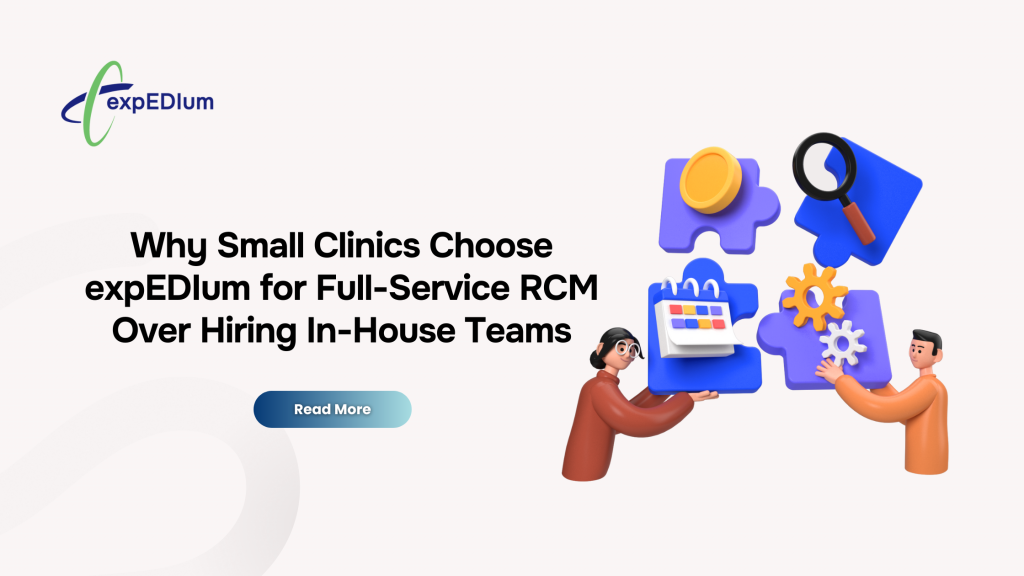Small and mid-sized clinics often face a common question: Should we manage revenue cycle management (RCM) in-house, or is outsourcing a better alternative? For many administrators, the decision revolves around balancing costs, compliance, staffing challenges, and operational efficiency.
Revenue cycle management is not simply about billing—it includes patient eligibility verification, claims submission, denial management, payer-specific compliance, and accurate reimbursement tracking. When handled inefficiently, the financial health of a clinic can suffer, regardless of how well it serves patients.
In recent years, many small practices have shifted towards outsourced RCM for small clinics, preferring specialized vendors like expEDIum over building and maintaining in-house billing teams. The reasons go beyond cost—they touch on scalability, compliance assurance, reduced administrative burden, and faster reimbursements.
This blog explores why small clinics often choose full-service RCM solutions like expEDIum instead of hiring and training in-house teams, along with real-world scenarios and data-driven insights.
1. Cost Efficiency: Outsourcing vs. In-House Teams
Running an in-house RCM department requires significant investment. Clinics must budget for:
- Salaries of billing staff
- Ongoing training on payer rules and compliance updates
- Billing software and IT infrastructure
- Employee benefits and retention costs
According to the Medical Group Management Association (MGMA), small practices can spend up to 14% of their total revenue on administrative costs related to billing and insurance tasks.
Outsourced RCM providers, on the other hand, work on a percentage-based fee structure. Clinics avoid upfront costs of hiring, software, and infrastructure, while ensuring professional management of claims. This makes outsourcing particularly attractive for small practices that operate on thin margins.
2. Access to Expertise Without Staffing Challenges
Hiring and retaining experienced billing professionals is a challenge for smaller clinics, especially in rural or semi-urban areas. Staff turnover can cause disruptions in claim submissions and delay reimbursements.
By partnering with a vendor like expEDIum, clinics gain access to:
- A team of billing experts trained across specialties
- Knowledge of payer-specific rules and coding updates
- Dedicated denial management workflows
- Consistent support without staffing gaps
This expertise is difficult to replicate with small, internal teams. Outsourcing ensures that billing knowledge is not tied to individual employees but managed through established processes.
3. Compliance and Error Reduction
Compliance with HIPAA and payer guidelines is non-negotiable. Even small mistakes in coding, documentation, or claim submission can result in denials, penalties, or audits.
Outsourced RCM providers operate with compliance-focused frameworks, regularly updating teams on changes in CMS regulations and payer requirements. Automated checks in RCM workflows further reduce human errors.
For small clinics that cannot afford compliance failures, outsourcing provides a safeguard that internal teams may struggle to maintain.
4. Faster Reimbursements and Cash Flow Stability
One of the most pressing pain points for small clinics is delayed cash flow. Claims often get stuck due to errors, incomplete documentation, or payer-specific delays.
Outsourced RCM providers focus on minimizing days in accounts receivable (A/R). With dedicated denial management and electronic claim submissions, reimbursements are processed faster, leading to steady cash flow that keeps clinic operations stable.
For example, a two-physician family practice might experience A/R days exceeding 60 when billing is handled internally. With outsourced RCM, those A/R days can often be reduced to under 35, improving financial predictability.
5. Scalability Without Added Burden
Small clinics typically experience fluctuations in patient volume. Expanding services or specialties often means additional coding expertise, more billing staff, and larger infrastructure.
Outsourced RCM offers scalability without added administrative burden. Whether a clinic adds new providers, specialties, or services, the RCM vendor adjusts resources accordingly—something that’s harder to achieve with an in-house setup.
6. Real-World Example
Consider a small orthopedic clinic with three physicians and two administrative staff. Initially, billing was handled in-house, but staff turnover and delayed reimbursements created ongoing financial strain. After moving to an outsourced RCM provider:
- Denial rates dropped significantly due to accurate coding and claim checks
- Cash flow stabilized, enabling the clinic to expand diagnostic services
- Administrative staff could focus on patient coordination instead of billing
This illustrates how outsourcing RCM directly impacts the sustainability of small practices.
Why expEDIum is a Preferred Choice
While many RCM vendors exist, expEDIum provides full-service solutions tailored to small and mid-sized practices. Clinics choose expEDIum because of:
- Experience across multi-specialty billing
- Transparent reporting and analytics
- Integration with EHR systems for seamless workflows
- Proven compliance with HIPAA and payer regulations
Unlike generic outsourcing firms, expEDIum aligns with the operational and financial realities of smaller clinics.
Conclusion
For small clinics, the decision to outsource RCM is more than a cost-saving measure—it’s a strategic step towards financial stability, compliance, and growth. By eliminating staffing challenges, reducing errors, and ensuring faster reimbursements, outsourced RCM for small clinics proves to be a sustainable solution.
As clinics continue to balance patient care with financial health, outsourcing RCM to trusted providers like expEDIum helps ensure that administrators can focus on improving services without worrying about the complexities of billing and compliance.
If your clinic is considering outsourcing RCM, explore how expEDIum can streamline your billing, improve compliance, and secure steady cash flow. Get in touch with expEDIum today.
Suvarnna Babu is a B2B content marketer and Digital Marketer at expEDIum, where she specializes in writing healthcare tech blogs that simplify complex RCM and EHR concepts for providers and billing professionals. With a background in English Literature and hands-on experience in SEO, email marketing, and paid ads, she creates content strategies that align with business goals and resonate with real-world users.
